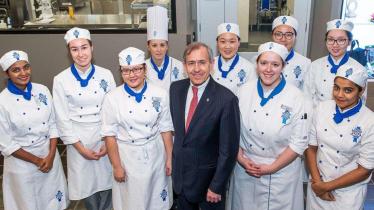After a decade of nurturing culinary talent in India, Le Cordon Bleu (LCB), the over a century-old culinary arts and hospitality management institution from France, has decided to strengthen and enhance its brand presence in the country. On his recent visit to India, Andre J Cointreau, the president & CEO of LCB, spoke with Vaishali Dar on the culinary scene in the country, the institute’s growth and more. Edited excerpts:
What is the purpose of your India visit? How has your experience been?
We are strengthening our relationship with GD Goenka University in India. Initially, we had an academic partnership, now we’ll be operating a full campus. With high demand for professional undergraduate and diploma programmes in hospitality management and culinary arts, the campus will now feature 50,000 sq ft of technical training areas spread over 60 acres in Gurugram. Facility expansion will aid teaching and training for 500 additional learners, through introduction of a culinary theatre, three new training kitchens, two new pastry kitchens, one new bakery, one additional chocolate artistry room, and multiple student experience areas.
The university itself is making numerous investments, which are indicative of this acceleration. These include implementing our systems, processes, and one educational platform, which is shared by over 35 LCB institutes across 20 countries. I believe that this development is highly beneficial for India, a country experiencing remarkable growth.
Can you tell us about the culinary scene post-pandemic?
There’s been tremendous growth in the tourism and hospitality sector post-Covid. New destinations, new hotels, a strong surge in domestic as well as international tourism. We’ve observed significant shifts in both demand and in the overall landscape. Notably, there’s been a surge in newer players entering the field alongside established global hospitality giants further strengthening their presence across the world. Why just hotels, there’s a surge in restaurants, homestays, cafes, bakeries and alternate hospitality options too. Industries across the spectrum are recruiting hospitality talent. As we look ahead to the next decade, the demand for our undergraduate degree and diploma programmes will continue to rise. There’s certainly a dearth of talent given the high demand, and we are poised to fulfill this through exceptional education of global standards.
How does LCB stand out from other culinary schools in the world?
LCB, being 125 years old, has earned its reputation as the world’s leading and most awarded culinary and hospitality school. We’re today in a position to advise governments on the development of cuisine, professional training and programmes. We continue to maintain stringent quality despite our large footprint. Renowned global chefs like Julia Child, Eric and Bruce Bromberg, Mary Berry, Vicky Lau, Pooja Dhingra, Gastón Acurio are among a few alumni of LCB, reflecting its international approach. With operations in 20 countries across the globe, LCB continues to play a significant role in shaping the culinary landscape worldwide.
In the age of home chefs/ food influencers on social media, what is the relevance of a physical culinary school like yours? Has student enrollment gone up or down?
At LCB, we prioritise demystifying culinary knowledge by guiding students through a step-by-step process to become proficient practitioners. Our student enrollment continues to increase, with even home chefs joining us to enhance their skills and knowledge, aiming to expand their businesses.
Self-taught chefs bring fresh perspectives from their personal experiences. Can one become a professionally trained chef without going to a culinary school?
It’s crucial to infuse one’s personality into one’s learning journey. We value the diverse experiences that students and practitioners bring to our classrooms, enriching the learning environment for everyone. While it’s possible to develop competence in hospitality and cooking independently, a comprehensive understanding of these fields often requires guidance from professional experts with international experience and a researched pedagogical approach. Our focus on techniques allows for the transfer of knowledge across multiple cuisines, enabling students to gain a holistic understanding of hospitality and cookery.
Today chefs are experimental, introducing fusion food, new recipes. In your curriculum do you have space for innovation, or do you stick to traditional methods?
Innovation and creativity are integral components of the educational approach at LCB India. We emphasise students’ development of original recipes and presentations once they have established a strong foundation in knowledge and skills. Our students actively participate in various competitions to showcase their innovative ideas.
